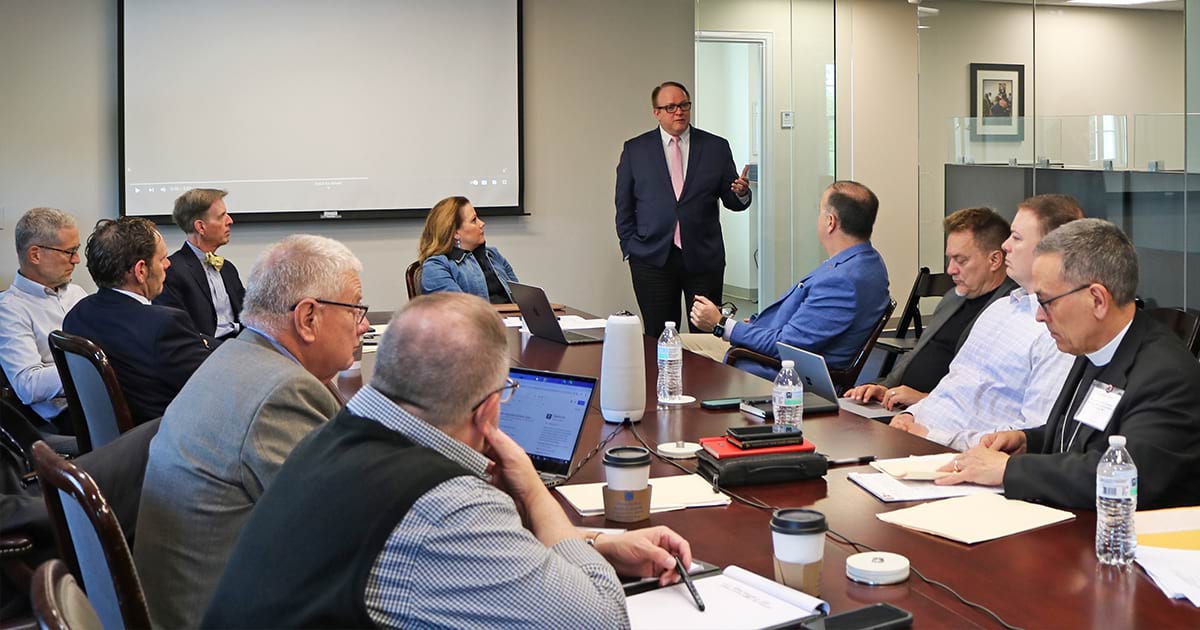
On April 17–18, 16 panelists and 14 specially invited guests gathered at the Museum of the Bible in Washington, D.C., for a colloquium on church and state issues as they relate to theologically conservative Christians. The colloquium, titled “Lutheran Participation in Politics: A Conversation on the Challenges of the American Context,” was sponsored by the LCMS Office of the President and Lutheran Church Extension Fund. It brought together specialists on matters of church and state from across the Synod, as well as additional panelists from other Lutheran denominations and guests from the D.C. area who share the LCMS commitment to religious liberty, pro-life issues and traditional marriage.
In the wake of increasing hostility to Christian convictions from an increasingly secularized society, the conference organizers — the Rev. Dr. Richard J. Serina Jr., associate executive director of The Lutheran Church—Missouri Synod (LCMS) Commission on Theology and Church Relations (CTCR), and the Rev. Graham Glover, a U.S. Army Reserve chaplain and senior pastor of Abiding Savior Lutheran Church and School in Gainesville, Fla. — devised the conference as a way to connect those in the Synod with background and interest in these issues. They described it as both a conversation and a catalyst: a conversation about how Lutherans should engage the political challenges and tensions they face in this culture, and a catalyst for how they might work together in the future.
“We need to know where to go for competent, trustworthy advice on political matters, being confident that our foundational Christian commitments will be heard, respected and taken into account,” said Serina. “The CTCR routinely seeks outside direction on matters related to church and culture — things like abortion and other beginning-of-life issues, marriage and sexuality, and church and state, among others. We need to know the most competent, theologically sound voices who can address these pressing political, legal, ethical and bioethical matters.”
The first day of the colloquium included multiple panels dedicated to a discussion of Lutheran political involvement; the Lutheran distinction between the two kingdoms; the intersection of the two kingdoms in education, the congregation and the military chaplaincy; and the challenges facing the church, specifically the laity, in the civil sphere. The papers led to vigorous discussion about how Lutherans can engage the civil realm according to their God-given vocations — whether that be the D.C. lobbyist or policy advocate on Capitol Hill, the layperson bearing witness to Christian morality in a workplace, or the pastor instructing his flock on theological matters that relate to broader society.
The second day featured a smaller discussion among panelists at the Religious Freedom Institute, an organization for which Glover serves as a chaplain fellow. That discussion focused on ways that LCMS entities can collaborate to more effectively educate their members on the Lutheran understanding of church and state, create resources for use in navigating increasingly challenging issues of church and state, and mobilize younger Lutherans to engage civil culture without forgetting their theological convictions.
“The relationship between faith and public life, or religion and public policy more broadly, is a fascinating and timely topic, and so it was refreshing and nourishing to gather with fellow Lutherans in a more sustained way … to deepen and broaden this endlessly interesting topic,” said Timothy Goeglein, a lifelong LCMS Lutheran currently serving as vice-president of External and Governmental Relations for the Christian advocacy organization Focus on the Family. “One of the things that I particularly enjoyed was hearing other perspectives … from people who live and work in other parts of the country and yet share precisely the same faith commitment and worldview on the issues that matter most.”
“Amidst the confusing cultural and political challenges today, a two-kingdom-informed citizenship in action is a tremendous blessing for the culture and the church. Many Lutheran leaders gathered … to put that wisdom to work,” added the Rev. Dr. Gregory Seltz, executive director of the Lutheran Center for Religious Liberty. “It was a great dialogue, a great beginning, affording an even greater opportunity.”
The colloquium’s organizers believe the LCMS has a unique set of resources across the country, from laity in civil service to connections with D.C.-area agencies. Their hope is that gatherings like these will serve as a springboard to new collaborations that support a united confessional Lutheran response to the challenges of the day. “I’m confident this colloquium will be the beginning of several new and innovative ways for our Synod to continue to offer its voice to an ever-changing public square,” Glover said.
Posted June 12, 2024